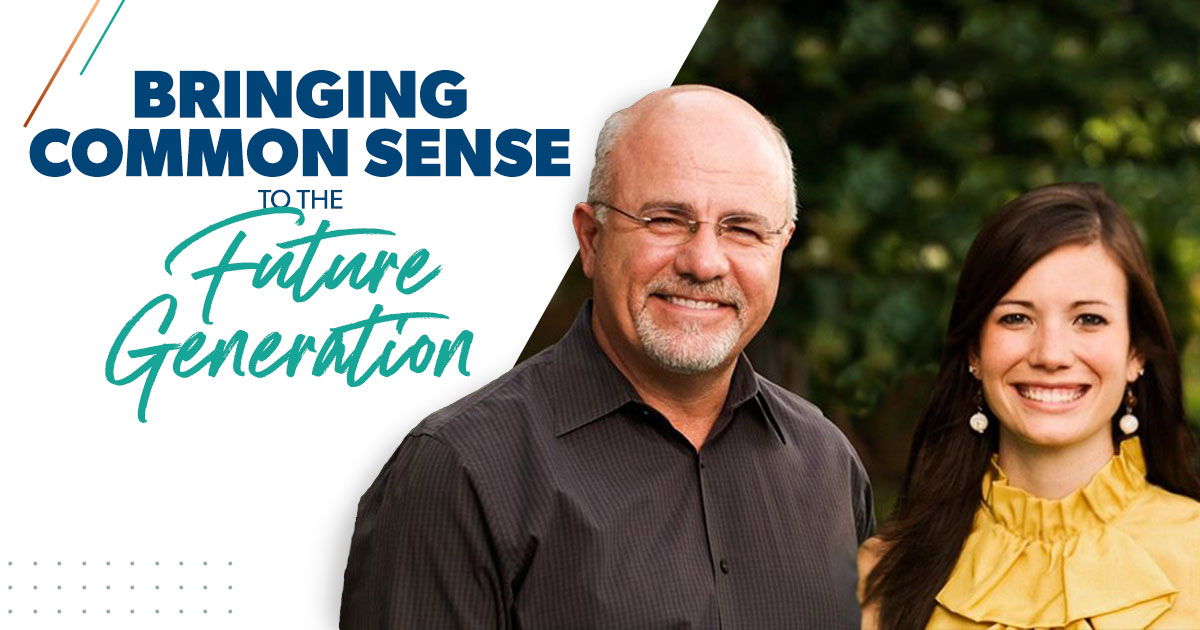Common Sense for the Next Generation
4 Min Read | Feb 25, 2022

Growing up as Dave Ramsey’s kid, you can probably imagine that the importance of making smart decisions with money was drilled into my head at an early age.
As long as I can remember, I’ve always been intrigued by my dad’s message about personal finance—which, as he’ll be the first to tell you, is just common sense. It’s all about not going into debt, living on less than you make, and helping other people.
The way his message has provided hope and saved marriages, and how people respond to it, has always captivated me. So when I was 15, I started traveling with him to his live events and doing a small segment on kids and money.
When I went to college, I realized how fortunate I was to have lived in a “financial bubble” for so long. The way I was taught to handle money, give, save, spend, budget, and live without debt was totally weird and completely opposite to the way most of my friends handled their money.
I met a girl at my freshman orientation during the first week of school. She had a brand-new luxury car. It was beautiful.
When I told her how awesome her car was, she said, “Thanks! I got it for high school graduation and had to get a car loan. It’s my first loan, and I feel like an adult!”
I was pretty shocked. So I had to break it down for her. My response was something like this:
“You have a car loan every month? Did you know the average car payment in North America today is $482, and if you put that in a good growth stock mutual fund, averaging 12% from age 18 to 65, you could have $5.2 million dollars?”
Just kidding. I wasn’t quite that technical. But I do remember saying something about a mutual fund, to which she responded, “What’s a mutual fund?”
That’s when it hit me, when I had my “lightbulb moment.” My generation has such a lack of knowledge about money. Even the most basic areas of personal finance, like reconciling a checking account, are far beyond a lot of people in my generation.
That’s scary. Even more scary is that a lot of people are in trouble—or at least headed down the road to being in trouble, buried in credit cards and student loan debt.
Twenty-two-year-olds are graduating with tens of thousands and even hundreds of thousands of dollars in debt. That’s just insane!
They need to know this stuff. Since I’ve been living these principles out in my own life for years, I decided that I had to go out and spread this message.
Sure, my dad has been doing a great job of reaching people of all ages for a long time, but it never hurts to have a younger voice out there. That just helps show that personal finance isn’t something you wait until you are 30 to start caring about.
If you pay attention to your money in your teens and 20s, then you’ll be coasting by the time you are 30, rather than spending all your effort digging out of your student loan debt and credit card bills.
When I graduated from college a few years ago, I came on board dad’s team fulltime, and I’ve never been more passionate about spreading this message. I’ve been traveling all over America, talking to high school students, college students and young adults on common-sense, biblical ways to handle their money.
Want to build a non-anxious life? Learn how in Dr. John Delony’s new book.
Instant gratification is so rampant in my generation, so I emphasize patience and contentment.Too many people my age look at what their parents have and want to have that right now. They don’t think about the fact that it took their parents 30 years to get where they are today.
Think about “The Tortoise and the Hare,” a story most of us read as kids. It’s a great reminder that patience pays off, no matter how old you are.
Most of us aren’t Mark Zuckerberg—billionaires when we are in our 20s. We’ll have to spend a lot of time building wealth, saving money, and investing. And that’s okay. Because when we do that, and when we follow these common-sense principles, we’re going to set ourselves up for incredible success later in life.
Around the office, we call it “changing your family tree,” which is a good reminder that your success now isn’t just about you. It’s also about your kids, your grandkids, and even several generations down the line. Your actions today matter.
So, remember, you can’t shortcut your way to financial success. “Get rich quick” just doesn’t work.
Be patient. Learn contentment. More than anything, that’s the message I want my generation to hear.

